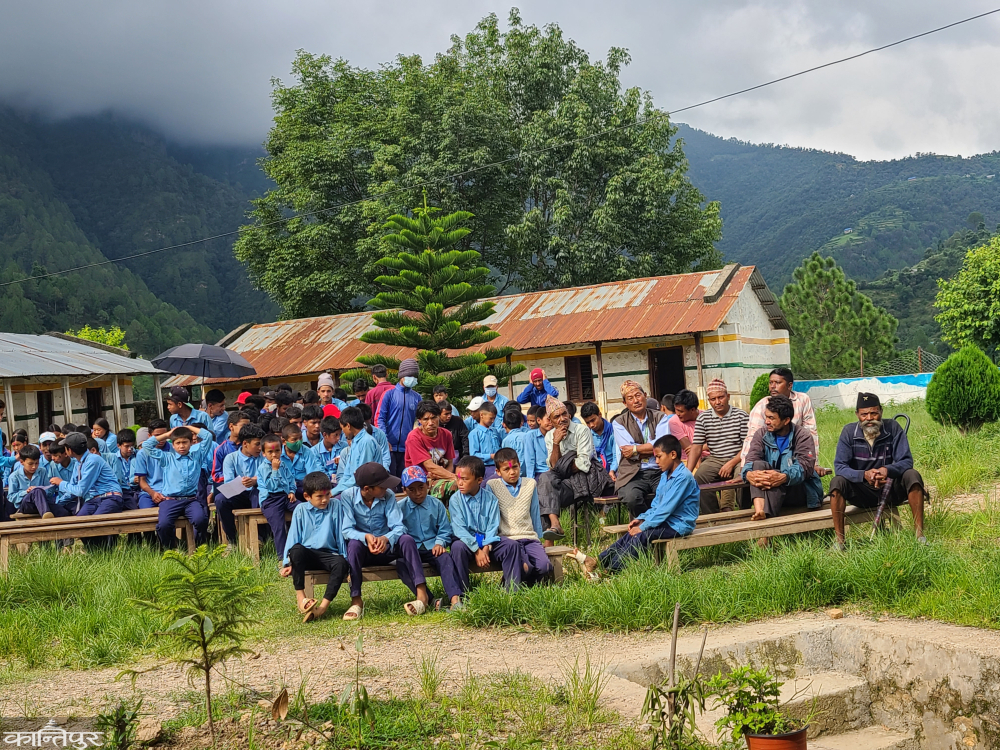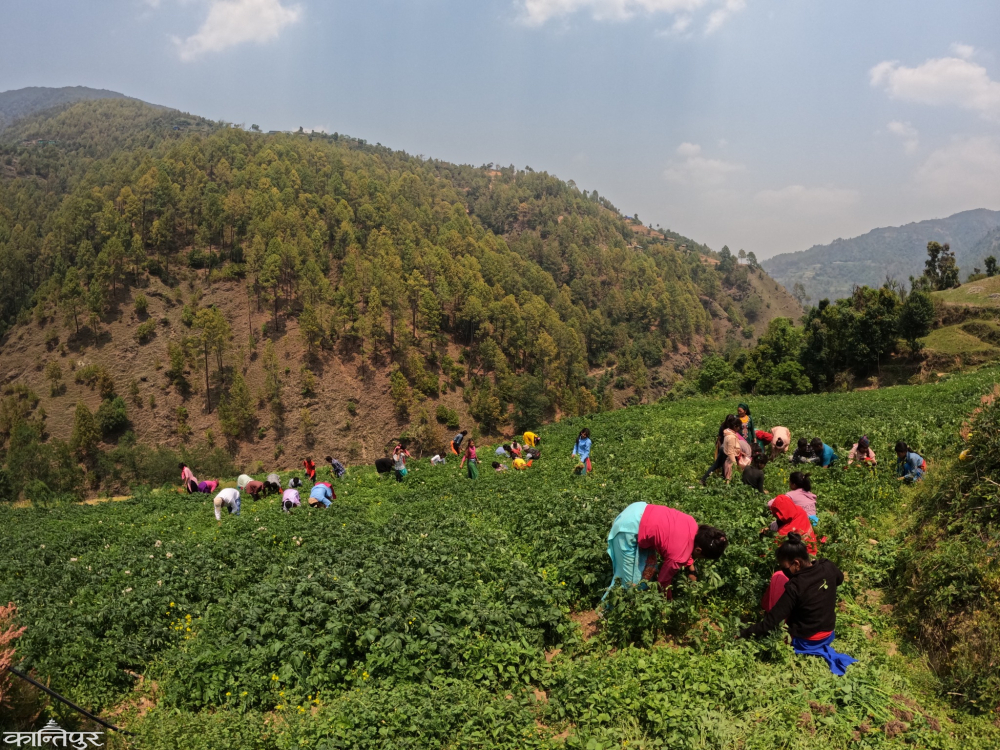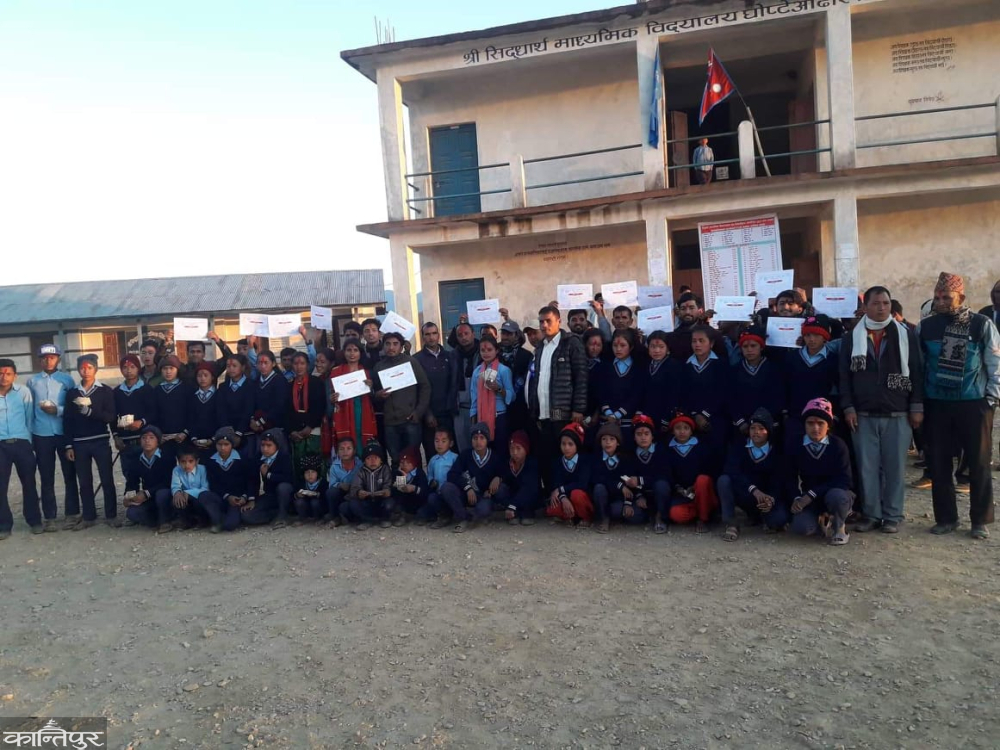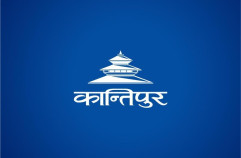Community schools in remote areas teaching practical knowledge
We use Google Cloud Translation Services. Google requires we provide the following disclaimer relating to use of this service:
This service may contain translations powered by Google. Google disclaims all warranties related to the translations, expressed or implied, including any warranties of accuracy, reliability, and any implied warranties of merchantability, fitness for a particular purpose, and noninfringement.


Siddharth Model Secondary School is in a corner of Western Village Jinabang. Educational activities have become attractive in the school, which is very remote from the development point of view. Here, students are regularly attracted to the school by new methods and measures. Students studying in school are made to focus on other tasks along with reading.


Students are also encouraged to learn
practical knowledge and skills. Sometimes the students are busy in farming and sometimes they are engrossed in creating music. "The plan is not only to make the school a model, but to make the students capable citizens," says teacher Prem Bahadur Wali, the coordinator of the model school campaign, "as far as the resources allow, we are engaged in the work of teaching more skills to the students and making them capable citizens." As an additional activity, several training programs were conducted to focus on Naumati panche baja playing and creative writing. In addition to the knowledge within the curriculum given in the classroom, the aim is to teach practical knowledge to advance socially. That's why a campaign has been launched in the school for a few years to make them busy with 'book free work' i.e. activities other than the curriculum.
To give extra knowledge to the students, the famous guru who plays Naumati panche baja was brought to the school and initially 11 students were taught the skill . In the week-long program, songs and music made the school and the village happy. "It was good to invite music and instrument gurus to teach students skills," said KB Gurung, president of the school management committee.
On the same occasion, the members of the local Janajagaran Amama group also had the opportunity to learn the skill. Parvati Vali, a member of the mother group, said, "Seeing a new kind of instrument for the first time gave me the opportunity to learn how to play it." The Guru who brought Sanahi, Narsinga, Dholak, Damaha, Temki, Jhyali, Madal and Karnal to the school also taught the students to play. Everyone was happy to see the instrument for the first time and to hold and learn it for 10 days .
Similarly, the school conducted a creative writing program for 3 days to teach the skills of literature and music. Dr. Devi Nepal, a famous writer of Nepali literature, was invited from Kathmandu to Jinabang in Rolpa. The poet taught all the students how to create poems, songs and ghazals. In addition, the skill of reciting those creations was also taught.

The chairman of the school management committee, Gurung, says, "By doing this, internal talent will emerge in the students". Students who are interested in literature and music will get more help to decide the way forward. He said that every Friday, programs are being conducted in the school to enhance and develop talent.
Apart from that, the school has been renting land for 3/4 years and involving students in agricultural production. Potatoes, tomatoes, bananas, cabbages and fruits have been jointly cultivated under the leadership of the school teachers under the program 'Kamaye Pudah'. Such a campaign has helped students to be oriented towards financial gain.
After the sale of the potatoes planted last year, on the one hand, the fund of the school increased, and on the other hand, the skills of the students in agricultural production increased . Especially, by forming different groups under the leadership of upper class students, the lower class students will also be inspired . Last year, a student agriculture group consisting of 46 students earned 3.5 lakhs while cultivating potatoes.
Similarly, a group of 37 people were rearing bangur, a group of 80 people were cultivating garlic and a group of 71 people were rearing chickens . Similarly, the number of students doing business at home with their parents has also increased. In this way, after the students make a financial profit by doing business, the school deducts the original investment and distributes the profit amount to the students.
from which students raise the cost of copy pens, uniforms and lunches . The school has planned to make the poor and weak students independent in this way. Lokman Wali, the ward chairman of Gangadeo Rural Municipality-3, said that he has been helping to make such a plan for the school.
"It makes me happy to see the students earning money in addition to studying", says teacher Wali, the coordinator of the model school campaign, "Baama is also very happy to see the work and hard work of his children". By 'earning while studying', the courage and courage to become self-reliant will increase in the students.

He said that there is a plan to involve all students in such activities if there are enough resources and means. He said that with the intention of making the school a model and increasing the educational quality, the locals have provided financial and material support.
The school, which was established in 2045, has not yet filled the teacher vacancies. 500 students studying up to class 12 in this school, there is zero post of secondary level teachers . According to Bir Bahadur Gharti, Principal of the school, Mavi Rural Municipality has sent 2 teachers and the Education Department has sent 2 teachers to the subsidy quota. Even at the basic level, there are relief posts of 3 teachers, while only 4 teachers are available at the primary level . 5 other teachers in the school have been recruited through private sources. A few years ago, the school launched a fundraising campaign to build a new building. During that time, the helpers in foreign countries provided financial support .
Similarly, Bir Balabhadra Mavi in Thabang has been teaching practical knowledge to students in addition to the knowledge given in the classroom. Under the 'Teaching and Teaching' program conducted in that school, the students are focused on agricultural work . School Principal Kul Bahadur Wali said that the aim is to make students self-reliant by cultivating mushrooms, vegetables and fruits.
'By doing this, it will help to change the behavior of the students and make them independent. We believe that such activities will help in the production of successful and capable citizens.'' he said.
The school that teaches skills and knowledge to students through extracurricular activities also includes the basic school of Rolpa Municipality-6 Dhabang. That school has been teaching the students to weave doko, namlo, damlo, mandro, bag and other essential household items . "Doing this on one hand will help in the development of the talent of the students and on the other hand it will help to make the students self-reliant by teaching traditional skills." said Prof. Vishal KC.
Another school in Rolpa that teaches domestic skills to students is Birendra Secondary School in Triveni Rural Municipality-7 Garigaon Gang. The school has also run a program called 'Reading and Earning' to connect students and parents. Students from poor economic conditions have been selected and their parents have also been involved and taught to run a business. For this, the school will provide financial support.
Cash has been distributed to the students by joining them in different groups, from which the students do goat rearing, poultry rearing, fish rearing, bengur rearing, vegetable farming etc. "We give money after looking at the financial condition of the students and encourage them to do business". When doing business together with the family, everyone will be accepted. Chitra Bahadur Jhankri, president of the school management committee, says, "This work has been effective." On the one hand, students come to the school regularly and on the other hand, they also become businessmen.' He said that the school invests in students by playing
philo, gathering support and collecting funds provided by rural municipalities and associations. Prof. Barman Budhamgar said that the parents and teachers who made the school a model, which was established in the year 2034, are still preparing to come up with a new plan. Currently there is also a program of 'Education with Sanskar'.

In this way, even with limited resources and means, it has become easy for the students of remote public schools to acquire new knowledge and skills through these new programs creatively launched by the schools. Educational campaigner Sandeep Thapa Magar said that equality will come if creative activities can be done in all schools of the district. There are more than 400 schools in 10 local levels of the district.
प्रकाशित : चैत्र ५, २०८० २१:२२
 २३.१२°C काठमाडौं
२३.१२°C काठमाडौं















